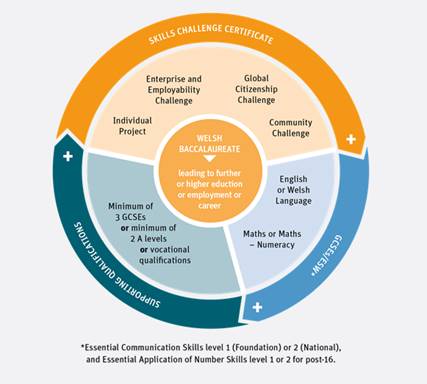Welsh Baccalaureate could be a rewarding qualification if delivered effectively

The Welsh Baccalaureate is an effective and valued qualification where it is delivered well, according to the National Assembly’s Children, Young People and Education Committee.
The qualification can offer skills for future learning and employability that might not otherwise be developed under more traditional qualifications, but there is negativity associated with the Welsh Bacc among both learners and education professionals.
The Committee found some schools in Wales don’t value it and consider it time consuming. Other negative perceptions identified were attributed to a lack of understanding of the Welsh Bacc’s purpose and content. The Committee also heard evidence that there was inconsistency in the delivery of the Welsh Bacc across Wales.
Meanwhile, there is still confusion about the way in which universities across the UK assess/perceive the Welsh Bacc as a qualification , including whether it is accepted as an equivalent A-Level. Among employers, there is also a lack of understanding as to the qualification’s purpose despite a focus on giving young people the transferable skills they need to make them ready for employment.
The Committee wants to see a clearer statement from the Welsh Government about its vision for the Welsh Bacc and on the expectations and resources needed to deliver it. It also recommends a broad campaign to raise awareness of the benefits of the qualification among businesses and higher education institutions.
The Committee included young people in its inquiry, conducting a survey and holding focus groups and gathered a wide range of differing views, both positive and negative. One concern raised by young people is that the pressure of undertaking the Welsh Bacc was adding stress at a time when they were already facing the pressure of other courses or exams.
The compulsory nature of the qualification added to pupil stress – with many arguing the qualification should not be compulsory. The Committee found the Welsh Government’s policy around universal adoption was unclear and that it should strengthen its guidance on this.
The Chair of the Children, Young People and Education Committee, Lynne Neagle AM, said:
“We wanted to hear directly from those on the frontline – pupils, parents, teachers, employers and universities – about their experiences of the Welsh Bacc to establish how widespread the challenges raised with us were.
“We found that negative perceptions of the Welsh Bacc are attributable to both a lack of understanding of the qualification’s purpose and content, and the inconsistency in its delivery across Wales.
“Nevertheless, we also found that understanding of the Welsh Bacc is growing and with it a greater sense of the value it can add to learners’ skills and experiences.”
The Committee believes the Welsh Government needs to learn lessons from the Welsh Bacc before the new Welsh curriculum comes in, as poor communication, lack of understanding and lack of resources have all contributed to sub-standard learning experiences for some pupils.
Lynne Neagle AM said:
“Despite our initial doubts, the evidence we gathered showed clear merit to studying the Welsh Bacc, particularly in terms of the breadth of skills developed by learners for future learning, employment and life.
“However, we concluded that the way in which the qualification is currently delivered and publicised is having a detrimental effect on its actual and perceived value.
“Teaching of the Bacc remains worryingly inconsistent, and duplication of effort and unmanageable assessment requirements are leaving teachers and learners understandably fatigued. For the Welsh Bacc’s potential to be fully realised, these issues need to be addressed as a matter of priority.”
The Committee makes ten recommendations in its report, including:
- That the Welsh Government issue a clearer statement about its vision for the Welsh Bacc, underpinned by guidance that details its expectations in relation to the consistency of the qualification’s delivery in Wales and the resources schools and colleges should make available to teach the qualification effectively;
- That the Welsh Government and Qualifications Wales work together to deliver a focused awareness-raising campaign for business and higher education institutions. This campaign should aim to increase understanding of the skills developed under the Welsh Bacc and encourage greater collaboration with those sectors in its design and delivery, to secure their engagement and buy-in; and,
- That the Welsh Government undertake work to provide a comprehensive list of those universities that accept the Welsh Bacc in their offers. This list should include details of exactly how each university treats the Welsh Bacc.
The report will now be considered by the Welsh Government.
What is the Welsh Bacc?
The Welsh Bacc is comprised of a number of component qualifications:
- the skills-based Skills Challenge Certificate qualification;
- GCSEs in English or Welsh Language, and Mathematics or Mathematics-Numeracy. The literacy and numeracy components of the Essential Skills Wales qualification can also be used; and
- a choice of supporting qualifications – GCSEs, A levels or vocational.
- The Welsh Bacc is awarded at three levels: Foundation (level 1) at key stage 4 or post-16; National (level 2) at key stage 4 or post-16; and Advanced (level 3) at post-16.
- A student is awarded the Welsh Bacc by achieving the specified combination of qualifications for each level. The Welsh Bacc at each level is graded as a pass or fail.
Source: Qualifications Wales
As part of our survey on the Welsh Bacc we asked learners and parents…
….how useful the Welsh Bacc is in preparing for work and life
Over 50% of respondents felt that the Welsh Bacc was less useful than other qualifications in preparing for work and life.
66% of respondents did not feel the Welsh Bacc would be valuable to future careers
….about the amount of time it takes to study the Welsh Bacc
Almost 70% of respondents felt that the Welsh Bacc was more time consuming than other ‘equivalent’ qualifications.
….what impact studying the Welsh Bacc had on studying other qualifications
Half of respondents felt it had a negative impact with 57% of saying it was too time consuming
Some thought the Welsh Bacc is a good qualification but wanted a choice about whether to study it or not
“The Welsh Bacc, especially at A Level standard, should NOT be compulsory . If learners choose to study it then they should be allowed to, but those who don’t want / need to study it should not be forced to do so.”
Survey promotion and analysis: The survey was publicised through committee networks, twitter, the Assembly’s Education and Young Engagement school visits and Outreach workshops. 1,203 responses were collected, 777 of which were from young people and 426 from parents/guardians. It does not provide a representative sample of the population.












Responses